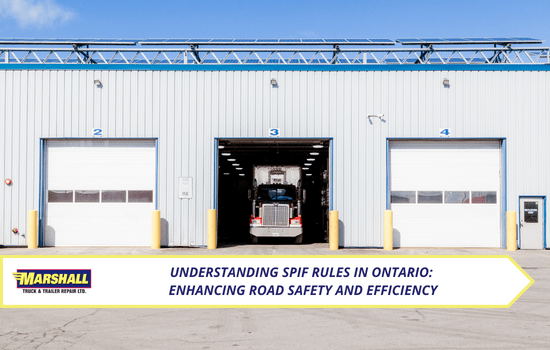In Ontario, Canada, ensuring road safety and the smooth operation of tractor-trailers is a top priority. As part of this commitment, the province implemented SPIF (Safe, Productive, Infrastructure-Friendly) rules. These regulations outline specific requirements for trucks operating on Ontario's roadways, promoting road safety, and efficiency, and minimizing infrastructure damage.
SPIF Rules Decoded: Optimizing Safety and Efficiency in Ontario's Trucking Industry
 In this blog, we will explore the SPIF rules in Ontario, providing a comprehensive overview of their purpose, key components, and benefits. Marshall Truck & Trailer Repair is a certified SPIF shop to ensure your truck and tractor-trailer meet current SPIF regulations.
In this blog, we will explore the SPIF rules in Ontario, providing a comprehensive overview of their purpose, key components, and benefits. Marshall Truck & Trailer Repair is a certified SPIF shop to ensure your truck and tractor-trailer meet current SPIF regulations.
What Are SPIF Rules?
SPIF rules are a set of guidelines established by the Ministry of Transportation in Ontario to govern the design and operation of commercial tractor-trailers The primary objectives of SPIF rules are to enhance road safety, minimize pavement damage, and improve the overall efficiency of the commercial trucking industry.
Key Components of SPIF Rules
- Weight Restrictions: SPIF rules establish specific weight limits for commercial vehicles based on their axle configurations. This helps distribute weight evenly, reducing the strain on road surfaces and minimizing pavement wear and tear.
- Axle Configuration Standards: SPIF rules outline axle spacing and configuration requirements, ensuring proper weight distribution and load transfer. This helps improve vehicle stability and maneuverability, reducing the risk of accidents.
- Suspension Specifications: SPIF rules define suspension standards to enhance vehicle control and stability, particularly during braking and cornering maneuvers. Compliance with these specifications contributes to safer and more predictable vehicle behaviour on the road.
- Brake Performance Requirements: SPIF rules establish guidelines for braking systems to ensure adequate stopping distances and braking efficiency. This includes provisions for antilock braking systems (ABS) and other advanced braking technologies.
- Tire Specifications: SPIF rules address tire specifications, including load ratings, tire size, and tread patterns. These requirements help ensure optimal traction, handling, and durability, further enhancing road safety and minimizing tire-related incidents.
Benefits of SPIF Compliance
- Enhanced Road Safety: By adhering to SPIF rules, commercial vehicles are designed and operated with a focus on safety. Improved weight distribution, optimized braking systems, and enhanced stability contribute to a safer road environment for all users.
- Infrastructure Preservation: SPIF rules help minimize pavement damage caused by heavy vehicles. Proper weight distribution and axle configurations reduce the stress on road surfaces, extending their lifespan and reducing maintenance costs.
- Increased Operational Efficiency: Complying with SPIF rules can lead to more efficient vehicle operations. Improved stability and control result in reduced fuel consumption, lower maintenance costs, and enhanced productivity for businesses operating commercial vehicles.
- Regulatory Compliance: Adhering to SPIF rules ensures compliance with Ontario's transportation regulations. This not only helps avoid penalties and fines but also demonstrates a commitment to safety and responsible operation within the commercial vehicle industry.
SPIF rules in Ontario play a crucial role in promoting road safety, preserving infrastructure, and enhancing the overall efficiency of the commercial vehicle industry. By following these guidelines, truck drivers can contribute to a safer and more sustainable transportation system.
